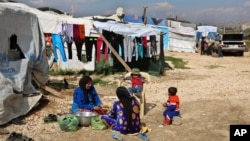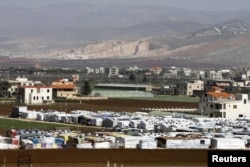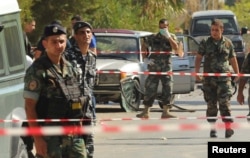When Syrian refugees first began crossing the border in search of safety, like many in Lebanon, the people of Ghazzeh welcomed them.
Sympathy in this small municipality nestled in agricultural plains neighboring Syria was plentiful; less than a decade before, tens of thousands of Lebanese had journeyed the other way in a bid to evade bombs that fell over their country during the 2006 war with Israel.
But with the Syrian war now in its sixth year and Lebanon’s economy in the doldrums, the hospitality of host communities has been severely tested.
And with well over a million refugees attempting to scrape out a life in Lebanon, it is not just the Syrians who are struggling.
Like a city
“It was a small village,” Ghazzeh’s mayor, Mohammad Almajzoub, explained of the transformation that has occurred. “Now it has become like a city.”
Exact figures for Ghazzeh are hard to establish. Almajzoub said its population had ballooned by refugees from 6,500 to 39,000; the U.N. estimates the number is closer to 8,500 original inhabitants, and 13,000 refugees.
With either measure, its clear the number of refugees in Ghazzeh is well above average, even in a country where one in four people are refugees, the highest ratio in the world.
Barely adequate before, the municipality’s infrastructure is now overwhelmed, while more mouths to feed means more competition for jobs.
Among those to feel the impact is Ali Ghazzawi, a Lebanese decorator who has lived in the municipality all his life and told VOA he had lost work due to new competition.
Once successful enough to begin building himself a house, he has had to abandon the work as he and his wife live hand to mouth.
“We cannot reduce our costs to meet their prices,” he said, referring to being undercut.
There are many others like Ghazzawi. A 2014 U.N. report warned the influx of refugees could leave between 220,000 and 324,000 Lebanese without a job, doubling unemployment.
Meanwhile, in other communities there are reports of rent prices rapidly rising in the wake of new demand.
Works both ways
Behind the till of his well-stocked grocery store in Ghazzeh, Lebanese father-of-two Muhammad Smaeli explained that he had to stop giving credit to customers to be repaid later.
“They lost their jobs and couldn’t pay,” he explained, “whereas before it would be a month, now they’ll settle it in six months.”
But Smaeli’s business stood in marked contrast to many of his peers, as the arrival of Syrians had boosted sales at the shop.
This, explained World Bank economist Wissam Harake, is indicative of the fact that despite burdens, the Syrian crisis isn't all a one-way street.
“If you have 1.5 million [refugees] added to the economy, they will consume,” he explained, “and some of them will invest, mostly in the informal economy.”
Such arguments do little to help ease the pressure on places like Ghazzeh.
Ratcheting up tensions
Frustrations and resentment have, sometimes, turned to violence.
Curfews have also been imposed by some municipalities, and there have been isolated reports of attacks on refugees, most of whom already live in poverty and in fear of the Lebanese state.
Meanwhile, every bomb that goes off in Lebanon threatens to ratchet up tensions.
The death of five Lebanese in a double wave of eight suicide bombings last week in the northeastern town of Al-Qaa sparked the mass arrests of more than 200 refugees and raids on refugee camps.
Despite warnings of a "breaking point", many Lebanese remain sympathetic to their Syrian neighbors. But with fears only inflamed by anti-refugee rhetoric from certain politicians, the tensions are there to be stoked.
“When people are destitute, they are far more sensitive to external conditions, and vulnerable to exploitation,” said Maha Yahya, a director of the Carnegie Middle East Center who said the impact of the refugee crisis is felt most acutely by some of Lebanon’s poorest.
“My concern is that every time we have a terrorist attack like the one seen in Al-Qaa, refugees will be targeted, and you’ll see spikes in xenophobia.”
Addressing the issues
There has been some, qualified, progress in addressing the issue.
During the past few years, a number of aid agencies have recognized the importance of assisting not just refugees, but Lebanese, too. Decorator Ghazzawi, for instance, benefited from an Oxfam project last year that provided work for both communities.
Meanwhile, in late 2014 the Lebanese government adopted the Lebanon Crisis Response Plan, which sought to achieve the same goal. But with donor money stretched, and a paralyzed central government financially drained, there is unlikely to be any long-term improvement for either Lebanese or Syrians until things change in Syria.
Ghazzeh’s Mayor Almajzoub is resigned, but hopes the aid agencies stick around.
“When this crisis started, if we had a spare room we would offer it to Syrians. It was assumed the crisis would be for a month, or even a year.” he said. “Now we’re in the sixth year ... we can’t do anything. We face catastrophe.”






